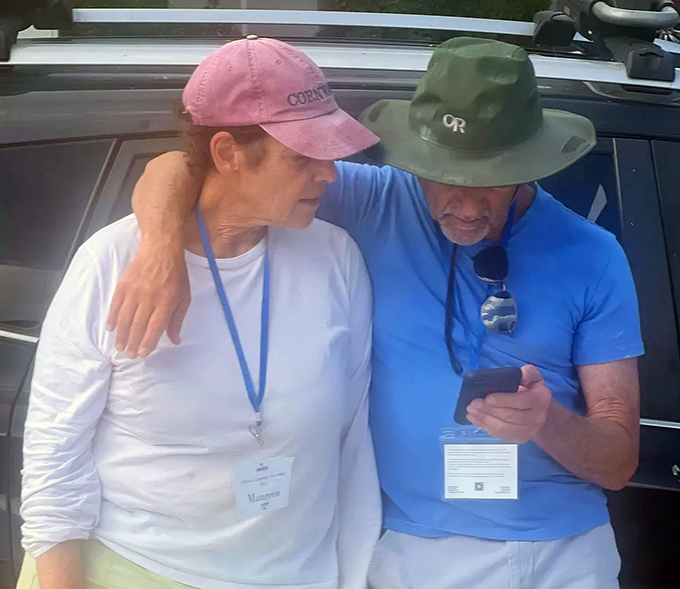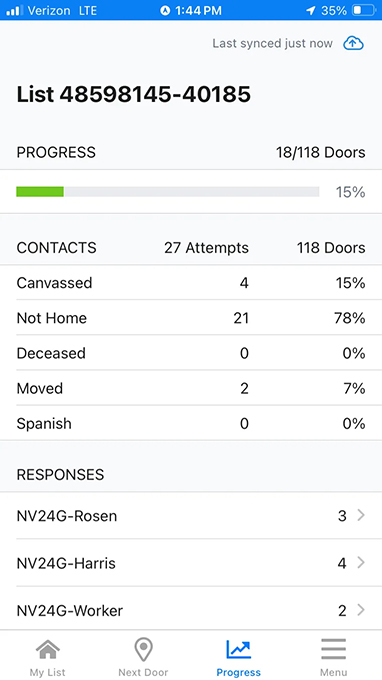Desert Conversations
By Fred Glass
My Reno trip to canvass against Trump

I spent three days last week in Reno, Nevada under the auspices of Seed the Vote, volunteering as a canvasser for the Harris-Walz campaign. Having canvassed in many campaigns over many years my expectations were low. I imagined I’d mostly knock on the doors of empty houses and apartments. That expectation was fulfilled.
Since our lists were of low-propensity voters, I also guessed when I did find people home I’d encounter large gaps where political knowledge should be. This too proved true. My personal goal was modest: stop 2024 in the United States from becoming 1933 in Germany (see my earlier Jumping Off Place article). I am less enthusiastic about the people I’m urging everyone to vote for than the historical function they will perform if elected: stopping the ascent of fascism.
Over seventy-two hours I had about ten actual conversations, including a couple potentially meaningful ones, and one honest-to-god conversion moment. I’m reporting here on three of the more interesting interactions, which occurred on the first day while trudging in ninety-degree desert heat from place to place in a working class suburb.
Conversation One: John, the nice Trumper*
You remember during the first years of the Trump administration when pundits and shellshocked naifs urged us all to reach out to uncles and nieces and former friends on the other side and “just talk” and then we’d find out how much we all really had in common? I found one in a trailer park rental complex, a tall, gaunt white seventy-nine-year-old named John.
When I told him I was a volunteer for the Harris campaign he asked if we could “just talk”, and told me he’s going to vote for Trump no matter what, but he wanted to hear what I had to say, because he doesn’t know what’s happened to this country that people can’t just talk with one another, and is that OK? I agreed to his terms. With each point I made (protection of the American Care Act, which Trump tried to repeal; Trump’s tax cuts for the rich, which meant less money in the federal budget for the needs of everyone else; his declaration that on Day One he’d be a dictator, etc.) John had a ready answer, none of which corresponded with any known reality, and a bottom line—“I trust him to do the right thing.”
When I left he said we’d given each other something to think about and politely thanked me for the discussion. This reception sharply contrasted with ones I received from other Trump supporters, the most civil of which was another old white guy who told me to leave so that he wouldn’t have to insult me. (On the opposite extreme, one of my canvassing partners was told through a smart doorbell to “get the fuck off my property and take your sacks of shit with you.”)
Conversation Two: The anarchists
In front of many homes in this neighborhood motorcycle, bicycle and car parts decorated the dusty yard; this was no exception. When I told Aurora, a thirty something Latina, I was there to ask for her vote for Harris she stepped out from behind the screen door onto the wooden porch and engaged. She said she couldn’t vote for Harris because she hadn’t distinguished her policy from Biden’s on Palestine, where United States bombs have been involved in an ongoing genocide. I surprised her by agreeing with the need for a ceasefire and withdrawing US military aid to Israel until that happens. But, I said, Trump would be no better on the issue and probably worse. Just as she was expanding her voting prohibition from Harris to all Democrats a voice said, “Behind you.”
A man about the same age as Aurora walked up with a machine part in his hand. We introduced ourselves and continued the conversation. Trevor repeated what Aurora had said, adding that he could no longer vote for Democrats after the way the party had treated Bernie; they’re as corrupt as the Republicans. I said while that’s true of the neoliberal half of the Democratic Party, the other half is made up of labor, women’s rights, civil rights, gay rights and environmental groups and sometimes it’s possible to get some progressive things done; meanwhile that’s completely impossible with the Republicans.
I said that what we’ve been talking about is only part of the picture; every US president is imperialist-in-chief internationally and it’s a mistake to think they can easily be persuaded to act differently. But there’s also the national side of the job, which involves important functions like appointments—to the courts and lesser-known agencies like the National Labor Relations Board, which can have an enormous impact on the working class, our rights, and daily life in the country. They listened but seemed unmoved.
I pulled out my trump card (sorry); under a Democratic administration there’s at least the room to move to protest destructive policies like Israel and Gaza. If Trump gets into office along with a Republican Congress, it’s going to be a police state this time around; things could look like Nazi Germany and much harder to mount any resistance. Aurora and Trevor nodded, like they had thought about this before, but didn’t comment on it.
Then Trevor said, “This is off to the side from what we’re talking about, but what do you think about no parties? Parties are how we have these problems.” Putting on my labor history hat, I said, “That’s what the Industrial Workers of the World wanted over a hundred years ago. Society would be run by workers’ committees, elected in each workplace. Their representatives would go to assemblies where decisions would be made.” He nodded. I said, “But unless you can tell me how we do that before November fifth….” He laughed.
Then he said that he knew of things that were going on that might “take Trump out” before Election Day. I asked what he meant. He said he couldn’t talk about it, but when that happened he hoped Kennedy could get back into the race and win. At this point I decided the conversation had achieved all its potential. We parted on friendly if inconclusive terms.
When I reported on this event with one of my canvassing partners she said, “Hunh, that’s different. Usually they kill the Kennedy and then someone else gets elected.”
Conversation Three: The truck driver
There’s no telling beforehand what issue might resonate with someone. Social Security typically works best for older people. But not always. At first, the twenty-seven year old man who came out to the porch after my canvassing partner Ralph and I knocked told us he had no intention to vote; politics didn’t matter; it’s all the same no matter who’s elected.
I said, “I assume you work for a living?” He said yes. What do you do? I’m a truck driver. You pay into Social Security? He nodded. I said, I’m retired, and I’m on Social Security. You’ve heard that they say Social Security might run out of money at some point down the road? He nodded again. I’m guessing you’d like to collect that money back that you’ve been putting into it? I had his attention.
I spoke about how Social Security is funded: payroll taxes. Workers pay in on their wages, and employers pay in a matching amount. But only up to $170,000 a year; anything over that is no longer subject to Social Security taxes. This is what puts Social Security in danger down the road: the many ways rich people have to get around paying their fair share of taxes, including this one. All we have to do is raise the cap so that rich people continue to pay in after $170,000 on all the money they make and Social Security will continue to be here for you, I said.
So who is better on this, and does it make a difference? We know that Trump won’t do that. In his first term he didn’t raise, he cut taxes for the rich. Kamala Harris wants to return taxes on the rich and corporations to higher levels. If you want to keep Social Security vote for Harris. So what do you think?, asked my partner Ralph. Juan smiled slightly: “You convinced me,” he said, and I could tell he meant it.
An encouraging sign
The three days in the hot sun were exhausting, but we were well-supported by our Seed the Vote organizers, who met with us each morning, gave us our lists, supplied us with water, phone batteries and snacks, and met again at the end of the day to debrief. One recurrent story gave some anecdotal hope for a victory margin in one cohort against Trump—and that’s what it was, less a vote for Harris and more an anti-Trump vote.
We heard this from people on the second day. One, a flight attendant in a more middle class suburb, told me she and her husband had been lifelong Republicans. But the craziness of MAGA plus persuasion from their two daughters, who had gone off to universities and come home politically transformed, put them over the edge. Now she was going to canvass for Harris, despite “some disagreements” that we didn’t get into.
The other, a retired architect in a very upscale neighborhood, spoke with my wife about his disenchantment with the Republican Party under Trump. He was an educated and cultured man, and couldn’t stand the lies and the vulgarities. He was going to vote the straight Democratic ticket. The seven people in our pod of canvassers had a number of similar stories from anti-MAGA ex-Republicans.
I haven’t seen any polling numbers among the old country club Republican ruling class set. Historically, ascendent fascism initially repels, and then reels in this demographic. It seems, however, from these encounters, and the growing number of Cheney types opposed to Trump, that the historic pattern might be abrogated here. We can hope.
.
*All the names are changed.
…
